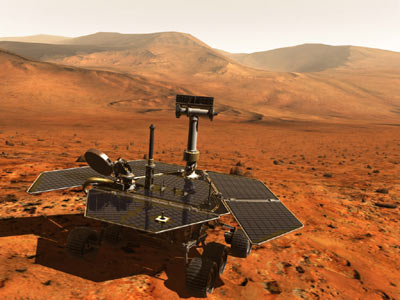Obituary
讣告
Opportunity
机遇号
Remembering a robot
铭记机器人
Opportunity, a rover on Mars whose time there exceeded all expectations, was declared lost on February 12th
“机遇号”火星探测器使用时间超过预期,于2月12日宣布失去联系
It travelled more than 500m kilometres simply as a passenger, sleeping dreamless, vacuum-packed. The five-and-a-half-month voyage was devoid of all interest until the very end, when the spacecraft lost 20,000kph of its velocity in just over six minutes as it plunged through an alien sky to the desert below. Parachutes spread and airbags deployed. The package bounced, rolled and came to rest.
“机遇号”是一位无需睡眠、真空包装的游客,旅行了超5亿公里的路程。五个半月的路程未引起什么波澜,直到最后,“机遇号”在6分钟多一点的时间里失去了2万公里每小时的速度,从火星天空坠入地下沙漠。降落伞打开,安全气囊就位。包裹了安全气囊的“机遇号”在滚落、弹起后,就永远地休息了。

Opportunity still had 45km to go.
“机遇号”还有45公里要走
Four hours after landing on January 25th 2004, it opened its eyes. Its makers, back on Earth, looked through them at a landing site as perfect as they could have wished for. Opportunity’s landing on Meridiani Planum, a little south of the Martian equator, had not been a particularly precise affair—it could have come down anywhere in an ellipse some 100km long and 18km wide. But by chance the spot where it had ended up, about 25km from the centre of the target, was inside a small crater dug out by a meteorite impact. On the side of that crater the scientists saw straight away the distinctive strata of sedimentary rock. Nothing of the sort had ever before been seen beyond the Earth. It was exactly the type of thing the robot had been sent to find.
2004年1月25日,“机遇号”着陆4小时后,睁开了眼。而地球上的制造者通过“机遇号”,完美地如期看到了着陆点。“机遇号”降落在火星赤道以南一点的梅里迪亚尼平原上,降落点并不能精准把控,可能降落在长约100公里、宽约18公里的椭圆里的任何地方。但巧的是,在距离目标中心约25公里的地方,陨石撞出了一个小陨石坑。在陨石坑一侧,科学家们可以直接看到独特的沉积岩地层。在地球之外,这是第一次见到这种物质。这正是派“机遇号”去寻找的物质。
Opportunity was officially MER-B, the second of the two rovers of the Mars Exploration Rover programme; MER-A, Spirit, had landed a few weeks earlier in the great Gusev Crater, almost half the planet away. Unofficially, it was Oppy, and often a she. The two rovers’ missions were due to last 90 sols—a sol being the 24 hours and 40 minutes it takes Mars to turn on its axis. Faced with that time limit, Opportunity’s minders were thrilled not to have to spend any of those precious sols just looking for interesting rocks.
“机遇号”正式命名为MER-B,是火星探测漫游者计划的两辆漫游车中的第二辆;MER-A“勇气号”几周前降落在几乎半个地球之外的古谢夫大坑。非正式来讲,“勇气号”曾叫做Oppy,而且常被称为她。这两辆火星车预计持续90个火星日——一个火星日是指火星自转一周所需24小时40分钟。面对这个时间限制,“机遇号”的保管员们很兴奋,因为他们不用再花宝贵的火星日去寻找吸引人的岩石了。
译文由可可原创,仅供学习交流使用,未经许可请勿转载。












